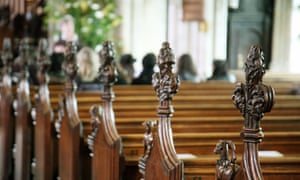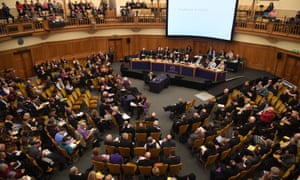More than 2,000 clergy and lay members sign letter asking bishops to withdraw guidance
Religion correspondent
@harrietsherwood Tue 29 Jan 2019 11.42 EST Last modified on Tue 29 Jan 2019 14.05 EST
The church issued guidance in December on services to allow trans Christians to celebrate their new identity and name. Photograph: Alamy
More than 2,000 clergy and lay members of the Church of England have signed a letter calling on bishops to withdraw or change recent guidance on welcoming transgender people to the church.
Last month the church issued advice to clergy and congregations recommending an adapted affirmation of baptism service to allow transgender Christians to celebrate their new identity and name.
The guidance was criticised by a group of bishops who described it as “theologically and pastorally questionable”. One member of the archbishops’ council, the Rev Ian Paul, suggested church leaders were “allowing themselves to be hijacked by these very small special interest groups”.
Now 2,155 clergy and senior lay members of the church have demanded the guidance be revised, postponed or withdrawn, saying “the notion of gender transition is highly contested in wider society”.
Their letter to bishops says: “Gender dysphoria is an emotionally painful experience that requires understanding, support and compassion. In recent years controversial new theories about the relationship between biological sex and the social meaning of gender have been linked to gender dysphoria. These ideas continue to be widely contested, with well-intentioned and thoughtful people on all sides of the debate.”
It adds: “The many ordinary parents and teachers who now express concern about these new theories do not wish to cause harm to the tiny number of children afflicted by gender dysphoria; but neither do they want to harm the potentially large numbers of children by potentially imposing untried and untested ideas on young children.”
Paul, an evangelical member of the general synod, said the letter highlighted “really important doctrinal, liturgy and pastoral issues that have not been adequately addressed”.
He said: “The fact that so many, from a wide range of traditions in the church, have been prepared to put their heads above the parapet is an indication of the strength of concern expressed here.”
Another signatory, Edward Dowler, archdeacon of Hastings, who is from the Anglo-Catholic tradition, said church leaders “might have been more circumspect about appearing to lend their support to an increasingly high-profile ideological movement whose aims and methods sit uncomfortably with the Christian gospel and are now being increasingly questioned throughout western society”.
Members of the general synod last year urged the church to go further in welcoming transgender people. But some conservatives believe gender is assigned by God and cannot be changed.
Tina Beardsley, a trans clergy member who was consulted on the guidelines, said it was important to be given official recognition by the church.
“This guidance arose from a decision at the general synod which was passed by an overwhelming majority. The signatories to the letter can’t accept this decision,” she said.
“The advice is to use the affirmation of baptismal faith service to reaffirm someone’s faith post-transition with the name they have adopted. That’s all we’re talking about. There is an anti-trans narrative in this letter which is unhealthy, stigmatising and fear-mongering.”
The joy that comes from embracing trans identity shouldn't be so rare
Andy Connor
George Haggett, a trans pastoral assistant, said: “My main qualm is so much of this discussion is taking place above trans people’s heads. The letter is not free from transphobia by any stretch of the imagination, and there is a nasty suggestion that trans people are causing harm to their families. This is not being done in good faith.”
The C of E says its guidance does not propose “transgender baptism services” but that clergy could use existing liturgy for baptism “in a creative and sensitive way” to mark a person’s gender transition.
A spokesperson said: “The bishops will give the letter their serious consideration, especially in the context of the preparation of a major new set of teaching and learning resources on identity, relationships, marriage and sexuality, Living in Love and Faith, which will be published next year. The guidance is not a restatement or a new statement on matters relating to gender, nor does it change the C of E’s teaching.”


No comments:
Post a Comment